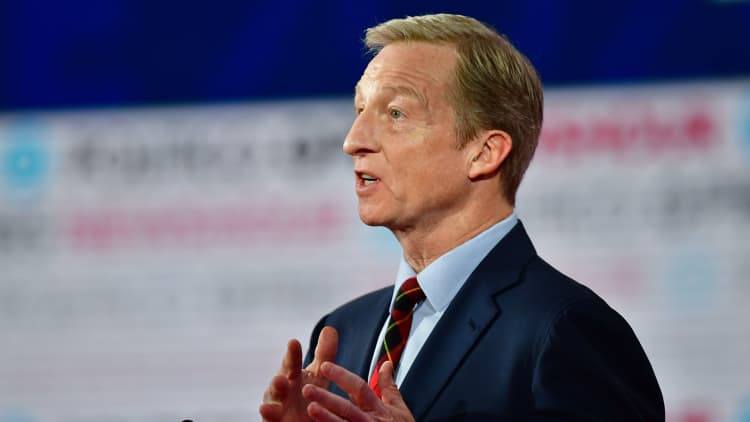Former Democratic presidential hopeful Tom Steyer isn't too happy with the Environmental Protection Agency (EPA) temporary rollback of environmental laws amid the coronavirus pandemic, calling it an "open invitation to pollute."
On Thursday, the EPA announced that companies will now be responsible for monitoring their own air and water pollution throughout the COVID-19 pandemic. The agency also said it does not expect to seek fines or penalties "for noncompliance with routine monitoring and reporting obligations."
"[B]ut [it] does expect operators of public water systems to continue to ensure the safety of our drinking water supplies," the EPA said in a statement Thursday.
Under normal circumstances, companies are required to submit routine reports when they release certain levels of pollution into the air or water. Now, the EPA is allowing companies to forego submitting those routine reports, if they have a legitimate reason for not being able to do so, a spokesperson says.
The EPA said the new policy is temporary and is an effort to help companies who are short-staffed due to the COVID-19 pandemic, as well as to alleviate demands on the EPA staff in answering routine monitoring questions.
However Steyer, a self-made hedge fund billionaire-turned-environmentalist, tells CNBC Make It, he thinks the agency is just using COVID-19 as an excuse to get rid of critical environmental rules altogether. Steyer points to the Trump Administration's history of rolling back countless environmental rules to make businesses flourish since getting into the White House in 2016.
"I think it's disingenuous. I think it is clearly an open invitation to pollute," Steyer says.
"Anyone who has spent time with families where people have died because of pollution," he says, knows.
For example, according to a study last April in the Proceedings of the National Academy of Sciences, more than 100,000 Americans each year die of heart attacks, strokes and other illnesses caused by air pollution from things like factories and motor vehicles.
The regulations are "not some trivial thing [or] some annoying bureaucratic rule that a pointy headed person in Washington, D.C. came up with. These are rules to protect the safety and the lives of American citizens, particularly low-income Americans. Particularly black Americans," Steyer adds.
The idea of companies that produce dangerous chemicals monitoring their own pollution is just plain wrong, he says.
In response, an EPA spokesperson tells Make It that the new policy in no way allowing companies to pollute.
"It is not a nationwide waiver of environmental rules. For situations outside of routine monitoring and reporting, the agency has reserved its authorities and will take the pandemic into account on a case by case basis," an EPA spokesperson added.
What's more, the EPA says the new policy does not say companies can use the COVID-19 pandemic as an excuse to exceed pollution limitations in permits, regulations and statutes.
EPA says it expects regulated entities such as oil and pharmaceutical companies to comply with all obligations and if they do not, the EPA will again consider actions on a case-by-case basis, while factoring in the current pandemic crisis when determining an appropriate response.
Further, if a company does experience an acute risk or imminent threat during this time, the EPA expects the company to notify them and authorized officials so they can address the risk, the spokesperson added.
For weeks, the EPA has been under pressure from a number of industries, including the oil industry, to suspend some environmental regulations due to the pandemic.
On March 20, oil and gas industry group executives at American Petroleum Institute (API) wrote President Donald Trump and the EPA asking for temporary relief on regulations such as record-keeping, training and other non-safety requirements, according to letter.
Still Steyer believes the EPA's decision during coronavirus is a "terrible" idea.
"I think it's them trying to use COVID-19 as a cover for getting rid of critical environmental rules," Steyer says.
"During this extraordinary time, EPA believes that it is more important for facilities to ensure that their pollution control equipment remains up and running and the facilities are operating safely, than to carry out routine sampling and reporting," an EPA spokesperson tells Make It in response. "It is a temporary policy and will be terminated when this crisis is past."
No date has been set on how long the temporary policy will be in place.
Check out: The best credit cards of 2020 could earn you over $1,000 in 5 years
Don't miss:
Coronavirus stockpiling: Don't waste your money on these items, according to a pandemic planner



